Unit 9 Have you ever been to a museum 现在完成时的用法; 现在完成时与过去式的辨析(课件16张)
文档属性
| 名称 | Unit 9 Have you ever been to a museum 现在完成时的用法; 现在完成时与过去式的辨析(课件16张) |  | |
| 格式 | pptx | ||
| 文件大小 | 166.5KB | ||
| 资源类型 | 教案 | ||
| 版本资源 | 人教新目标(Go for it)版 | ||
| 科目 | 英语 | ||
| 更新时间 | 2022-04-09 15:15:24 | ||
图片预览

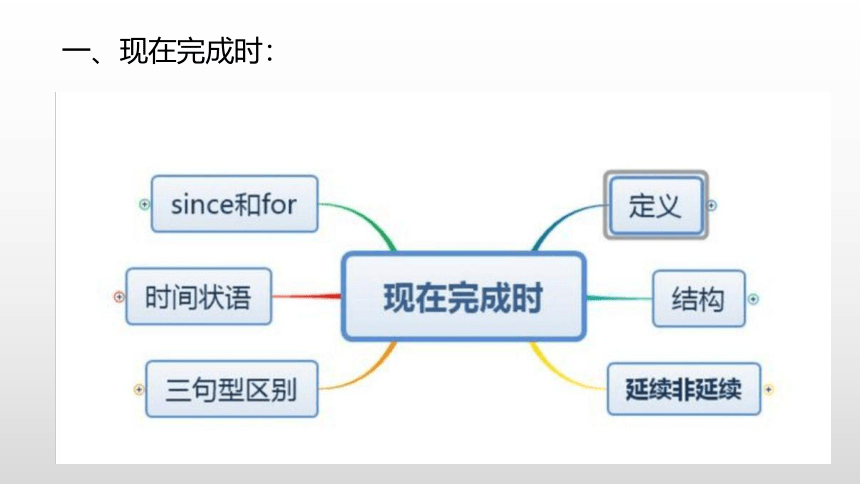
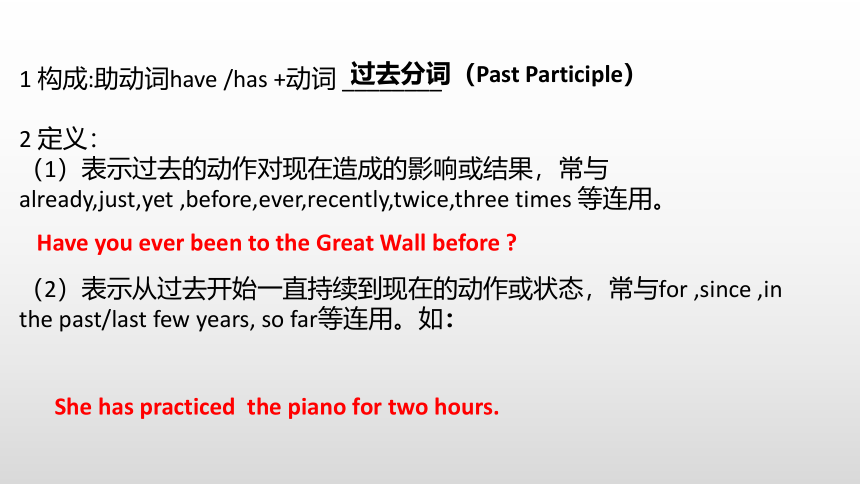
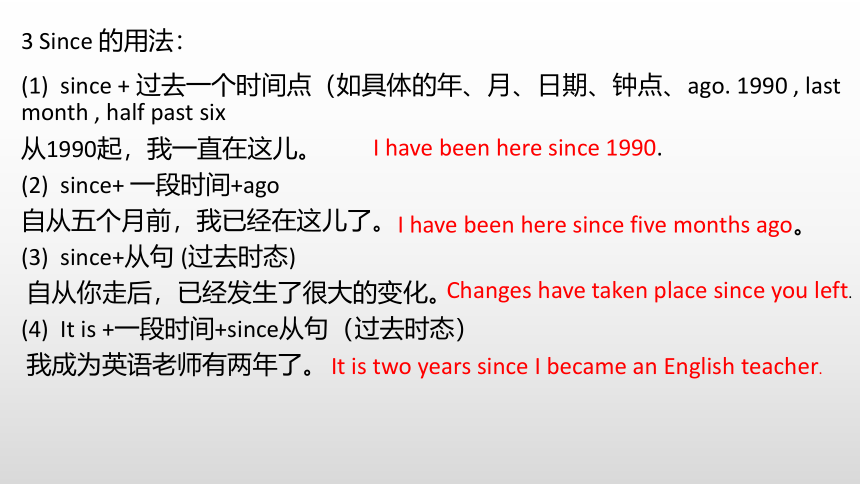
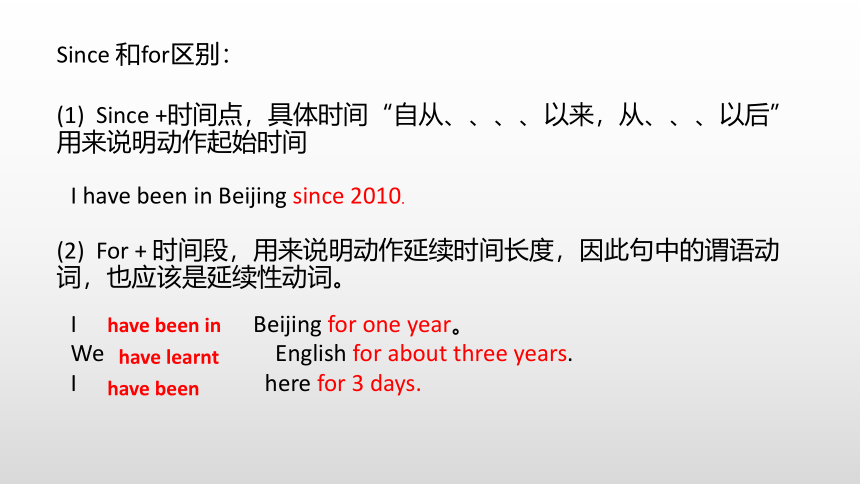
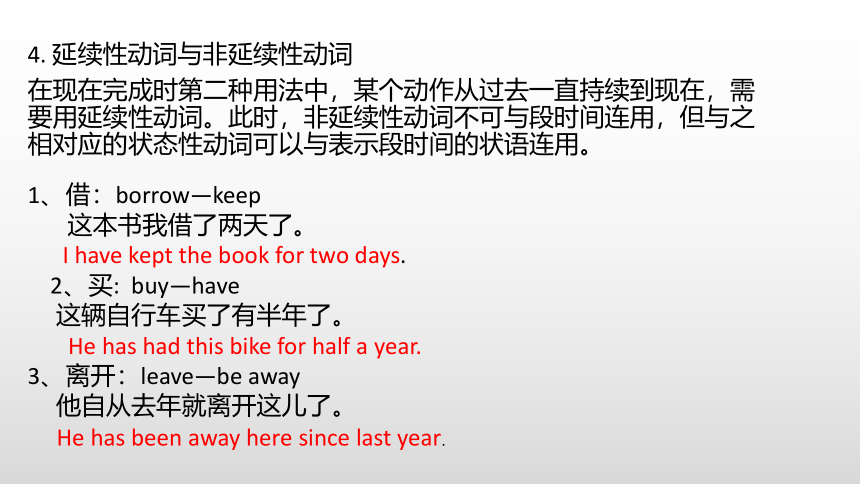
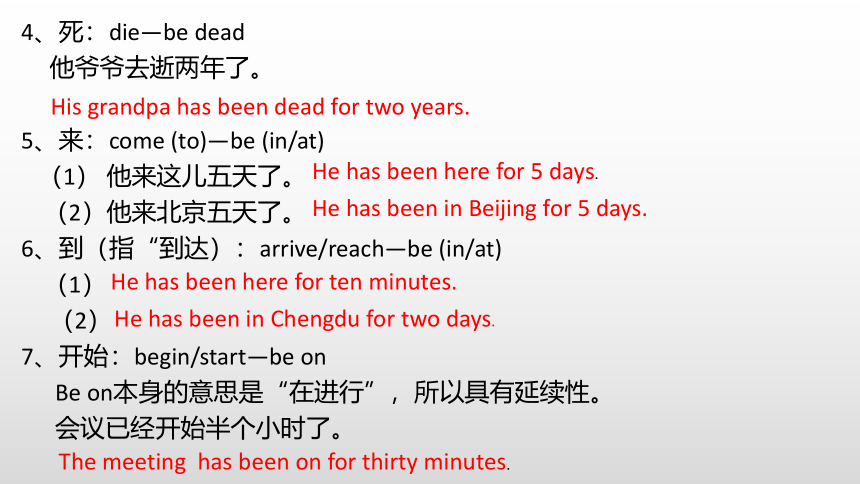
文档简介
(共16张PPT)
现在完成时与过去时
The Present Perfect Tens and Past Tense
一、现在完成时:
1 构成:助动词have /has +动词 ________
2 定义:
(1)表示过去的动作对现在造成的影响或结果,常与
already,just,yet ,before,ever,recently,twice,three times 等连用。
(2)表示从过去开始一直持续到现在的动作或状态,常与for ,since ,in
the past/last few years, so far等连用。如:
Have you ever been to the Great Wall before
She has practiced the piano for two hours.
过去分词(Past Participle)
3 Since 的用法:
(1) since + 过去一个时间点(如具体的年、月、日期、钟点、ago. 1990 , last month , half past six
从1990起,我一直在这儿。
(2) since+ 一段时间+ago
自从五个月前,我已经在这儿了。
(3) since+从句 (过去时态)
自从你走后,已经发生了很大的变化。
(4) It is +一段时间+since从句(过去时态)
我成为英语老师有两年了。
I have been here since 1990.
I have been here since five months ago。
Changes have taken place since you left.
It is two years since I became an English teacher.
Since 和for区别:
(1) Since +时间点,具体时间“自从、、、、以来,从、、、以后” 用来说明动作起始时间
(2) For + 时间段,用来说明动作延续时间长度,因此句中的谓语动词,也应该是延续性动词。
I have been in Beijing since 2010.
I Beijing for one year。
We English for about three years.
I here for 3 days.
have been in
have learnt
have been
4. 延续性动词与非延续性动词
在现在完成时第二种用法中,某个动作从过去一直持续到现在,需要用延续性动词。此时,非延续性动词不可与段时间连用,但与之相对应的状态性动词可以与表示段时间的状语连用。
1、借:borrow—keep
这本书我借了两天了。
2、买: buy—have
这辆自行车买了有半年了。
3、离开:leave—be away
他自从去年就离开这儿了。
I have kept the book for two days.
He has had this bike for half a year.
He has been away here since last year.
4、死:die—be dead
他爷爷去逝两年了。
5、来:come (to)—be (in/at)
(1) 他来这儿五天了。
(2)他来北京五天了。
6、到(指“到达):arrive/reach—be (in/at)
(1)
(2)
7、开始:begin/start—be on
Be on本身的意思是“在进行”,所以具有延续性。
会议已经开始半个小时了。
His grandpa has been dead for two years.
He has been here for 5 days.
He has been in Beijing for 5 days.
He has been here for ten minutes.
He has been in Chengdu for two days.
The meeting has been on for thirty minutes.
8、加入:join/take part in—be in
Join是加入某个组织、人群,take part in 是参加某个活动,都不具有延续性,但 be in表示“是在某人组织或活动中”,自然就有延续性。
他爸爸自从20年前就入党了。
9、患感冒:catch a cold—have a cold
Catch本身的意思是抓住,不能延续,但have表示“有”,能延续。
我自从上周五就感冒了。
10、打开:open—be open
Open这个词可以作动词,表示“打开”,但也可以作形容词,意思是“开着的”,因此,be open表示“是开着的”,具有延续性。
这家商店自从8点钟就开门了。
His father has been in the Party since twenty years ago.
I have had a cold since last Friday.
The shop has been open since 8:00.
11、关上:close—be closed
Closed是形容词,意思是“关着的”,所以be closed意思是“是关着的”,当然就具有延续性了。
这家商店自从上个月就关门了。
12、担心:worry—be worried
Worry是动词,意思是“担心”,但worried可以用形容词是,意思是“担心的”。
从那以后,她就一直担心她的儿子。
13、回来:come back/go back/return—be back
Come back是“回来”,go back是“回去”,return是“回(来,去)”,都不具有延续性,但be back中的be是表状态,所以就具有延续性。
他已经回来两天了。
.
The store has been closed since last month.
She has been worried about her son since then.
He has been back for two days
14、结婚:marry/get married—be married (to)
Marry是及物动词,意思是“和……结婚”,married是“结了婚的,已婚的”,是一个形容词,但get married中的get却是一个瞬间性动词。
(1)他和玛丽结婚两年了。
15、睡着:fall asleep—be asleep
Fall asleep中的fall本意是“落下”,是马上发生也马上结束的动作,不具有延续性。
宝宝自从八点钟就睡着了。
瞬间动词(变)延续动词:
借 买 开 死 来 到, 开 始 加 入 患 感 冒,
打 开关上又担 心 ,回 来 结 婚 睡 着 了。
He has been married to Mary for two years.
The baby has been asleep since 8:00.
5、三句型的区别
have/ has been to 某人去过某地
He Beijing twice.
have/has gone to某人去了某地
He isn't here. He Beijing.
have/has been in 某人呆在某地
He Beijing for 5 years.
has been to
has gone to
has been in
二、现在完成时与过去时的辨析
现在完成时与一般过去时的区别:
相同点:
不同点:
现在完成:时强调过去的动作对现在造成的影响或持续到现在,与现在有关。
一般过去:时只说明动作发生在过去,与现在无关。
现在完成时与一般过去时的动作都发生在过去。
(与现在的关系)
The boy has climbed the mountain twice.
(强调对现在的影响,这个男孩对这座山有一定了解。)
The boy climbed the mountain .
(只说明这男孩原来爬过这座山。)
练习巩固:
一、单项选择:
1、The famous writer _____ one new book in the past two year .
A. is writing B.was writing C.wrote D.has written
2、His father ______ the Party since 1978 .
A. joined B. has joined C. was in D. has been in
3、Hurry up! The play __________ for ten minutes .
A. has begun B. had begun C. has been on D. began
4、 It _____ ten years since he left the army .
A. is B. has C. will D. was
5、My parents ______ Shandong for ten years .
A. have been in B. have been to
C. have gone to D. have been
D
D
C
A
A
二、句型转换
1、The bus has arrived here. It arrived ten minutes ago. (把两个句子合并成一个句子)
___________________________________________
2、They have been here since 2000. (对划线部分提问)
have they been here
3、The old man _________ last year. He _________ for a year . (die) (动词填空)
4、This factory opened twenty years ago.(同义句转换)
This factory ________________ for twenty years.
5、Miss Gao left an hour ago. (同义句转换)
Miss Gao ______ _______ _________ __________ an hour ago.
6、Her mother has been a Party member for three years .(同义句)
Her mother _______ the Party three years ________ .
The bus has been here for ten minutes.
How long
died
has been dead
has been open
has been away since
joined
ago
总结回顾:
二、现在完成时与过去时的辨析
一、现在完成时的用法
Thanks for listening
现在完成时与过去时
The Present Perfect Tens and Past Tense
一、现在完成时:
1 构成:助动词have /has +动词 ________
2 定义:
(1)表示过去的动作对现在造成的影响或结果,常与
already,just,yet ,before,ever,recently,twice,three times 等连用。
(2)表示从过去开始一直持续到现在的动作或状态,常与for ,since ,in
the past/last few years, so far等连用。如:
Have you ever been to the Great Wall before
She has practiced the piano for two hours.
过去分词(Past Participle)
3 Since 的用法:
(1) since + 过去一个时间点(如具体的年、月、日期、钟点、ago. 1990 , last month , half past six
从1990起,我一直在这儿。
(2) since+ 一段时间+ago
自从五个月前,我已经在这儿了。
(3) since+从句 (过去时态)
自从你走后,已经发生了很大的变化。
(4) It is +一段时间+since从句(过去时态)
我成为英语老师有两年了。
I have been here since 1990.
I have been here since five months ago。
Changes have taken place since you left.
It is two years since I became an English teacher.
Since 和for区别:
(1) Since +时间点,具体时间“自从、、、、以来,从、、、以后” 用来说明动作起始时间
(2) For + 时间段,用来说明动作延续时间长度,因此句中的谓语动词,也应该是延续性动词。
I have been in Beijing since 2010.
I Beijing for one year。
We English for about three years.
I here for 3 days.
have been in
have learnt
have been
4. 延续性动词与非延续性动词
在现在完成时第二种用法中,某个动作从过去一直持续到现在,需要用延续性动词。此时,非延续性动词不可与段时间连用,但与之相对应的状态性动词可以与表示段时间的状语连用。
1、借:borrow—keep
这本书我借了两天了。
2、买: buy—have
这辆自行车买了有半年了。
3、离开:leave—be away
他自从去年就离开这儿了。
I have kept the book for two days.
He has had this bike for half a year.
He has been away here since last year.
4、死:die—be dead
他爷爷去逝两年了。
5、来:come (to)—be (in/at)
(1) 他来这儿五天了。
(2)他来北京五天了。
6、到(指“到达):arrive/reach—be (in/at)
(1)
(2)
7、开始:begin/start—be on
Be on本身的意思是“在进行”,所以具有延续性。
会议已经开始半个小时了。
His grandpa has been dead for two years.
He has been here for 5 days.
He has been in Beijing for 5 days.
He has been here for ten minutes.
He has been in Chengdu for two days.
The meeting has been on for thirty minutes.
8、加入:join/take part in—be in
Join是加入某个组织、人群,take part in 是参加某个活动,都不具有延续性,但 be in表示“是在某人组织或活动中”,自然就有延续性。
他爸爸自从20年前就入党了。
9、患感冒:catch a cold—have a cold
Catch本身的意思是抓住,不能延续,但have表示“有”,能延续。
我自从上周五就感冒了。
10、打开:open—be open
Open这个词可以作动词,表示“打开”,但也可以作形容词,意思是“开着的”,因此,be open表示“是开着的”,具有延续性。
这家商店自从8点钟就开门了。
His father has been in the Party since twenty years ago.
I have had a cold since last Friday.
The shop has been open since 8:00.
11、关上:close—be closed
Closed是形容词,意思是“关着的”,所以be closed意思是“是关着的”,当然就具有延续性了。
这家商店自从上个月就关门了。
12、担心:worry—be worried
Worry是动词,意思是“担心”,但worried可以用形容词是,意思是“担心的”。
从那以后,她就一直担心她的儿子。
13、回来:come back/go back/return—be back
Come back是“回来”,go back是“回去”,return是“回(来,去)”,都不具有延续性,但be back中的be是表状态,所以就具有延续性。
他已经回来两天了。
.
The store has been closed since last month.
She has been worried about her son since then.
He has been back for two days
14、结婚:marry/get married—be married (to)
Marry是及物动词,意思是“和……结婚”,married是“结了婚的,已婚的”,是一个形容词,但get married中的get却是一个瞬间性动词。
(1)他和玛丽结婚两年了。
15、睡着:fall asleep—be asleep
Fall asleep中的fall本意是“落下”,是马上发生也马上结束的动作,不具有延续性。
宝宝自从八点钟就睡着了。
瞬间动词(变)延续动词:
借 买 开 死 来 到, 开 始 加 入 患 感 冒,
打 开关上又担 心 ,回 来 结 婚 睡 着 了。
He has been married to Mary for two years.
The baby has been asleep since 8:00.
5、三句型的区别
have/ has been to 某人去过某地
He Beijing twice.
have/has gone to某人去了某地
He isn't here. He Beijing.
have/has been in 某人呆在某地
He Beijing for 5 years.
has been to
has gone to
has been in
二、现在完成时与过去时的辨析
现在完成时与一般过去时的区别:
相同点:
不同点:
现在完成:时强调过去的动作对现在造成的影响或持续到现在,与现在有关。
一般过去:时只说明动作发生在过去,与现在无关。
现在完成时与一般过去时的动作都发生在过去。
(与现在的关系)
The boy has climbed the mountain twice.
(强调对现在的影响,这个男孩对这座山有一定了解。)
The boy climbed the mountain .
(只说明这男孩原来爬过这座山。)
练习巩固:
一、单项选择:
1、The famous writer _____ one new book in the past two year .
A. is writing B.was writing C.wrote D.has written
2、His father ______ the Party since 1978 .
A. joined B. has joined C. was in D. has been in
3、Hurry up! The play __________ for ten minutes .
A. has begun B. had begun C. has been on D. began
4、 It _____ ten years since he left the army .
A. is B. has C. will D. was
5、My parents ______ Shandong for ten years .
A. have been in B. have been to
C. have gone to D. have been
D
D
C
A
A
二、句型转换
1、The bus has arrived here. It arrived ten minutes ago. (把两个句子合并成一个句子)
___________________________________________
2、They have been here since 2000. (对划线部分提问)
have they been here
3、The old man _________ last year. He _________ for a year . (die) (动词填空)
4、This factory opened twenty years ago.(同义句转换)
This factory ________________ for twenty years.
5、Miss Gao left an hour ago. (同义句转换)
Miss Gao ______ _______ _________ __________ an hour ago.
6、Her mother has been a Party member for three years .(同义句)
Her mother _______ the Party three years ________ .
The bus has been here for ten minutes.
How long
died
has been dead
has been open
has been away since
joined
ago
总结回顾:
二、现在完成时与过去时的辨析
一、现在完成时的用法
Thanks for listening
同课章节目录
- Unit 1 What's the matter?
- Section A
- Section B
- Unit 2 I'll help to clean up the city parks.
- Section A
- Section B
- Unit 3 Could you please clean your room?
- Section A
- Section B
- Unit 4 Why don't you talk to your parents?
- Section A
- Section B
- Unit 5 What were you doing when the rainstorm came
- Section A
- Section B
- Review of Units 1-5
- Unit 6 An old man tried to move the mountains.
- Section A
- Section B
- Unit 7 What's the highest mountain in the world?
- Section A
- Section B
- Unit 8 Have you read Treasure Island yet?
- Section A
- Section B
- Unit 9 Have you ever been to a museum?
- Section A
- Section B
- Unit 10 I've had this bike for three years.
- Section A
- Section B
